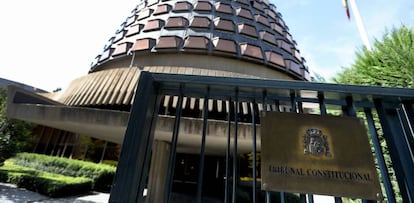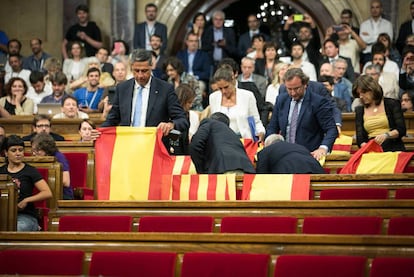Spain’s Constitutional Court strikes down Catalan referendum law
Decision confirms earlier suspension, and says breakaway law violated fundamental rights of citizens

Spain’s Constitutional Court on Tuesday unanimously confirmed that the referendum law passed by the Catalan parliament on September 6 is unconstitutional, and devoid of any binding legal force.
The law had already been on hold since September 7, when the court pre-emptively suspended it while it considered the case ahead of the referendum, which was ultimately held on October 1.
Catalan citizens are “at the mercy of a power that says it recognizes no limits”
The decision finds that the unprecedented and “arbitrary” way in which the pro-independence majority in the Catalan chamber rammed the bill through without proper debate “committed very serious violations of legislative procedure.”
The entire opposition within the Catalan parliament walked out in protest when the bill was put to the vote.
The minority government of Junts pel Si, a pro-independence coalition that gets legislative support from a small anti-capitalist party called CUP, drafted this bill in order to provide a legal framework for an independence referendum that had already been banned by the Constitutional Court.
Another controversial piece of legislation paving the way for a transition to an independent republic was passed two days later in a similar fashion.
Overreach
In its decision, the court states that the referendum law “encroaches upon state powers on referendum-type consultations, and violates the supremacy of the Constitution, national sovereignty and the indissoluble unity of the Spanish nation.”
Under the Spanish Constitution, referendums may only be held at the national, not regional, level. The Catalan referendum law skirted this rule, while the transition law awarded itself a higher position on the legal hierarchy than the Constitution itself.

The court notes that whether Catalonia remains or not a part of Spain is not the sole decision of residents of Catalonia, but of all citizens of Spain.
The court adds that constitutional reform is possible, but only through the channels established for that purpose – not outside the law. Regional parliaments may request such a move.
By acting outside these channels, the Catalan parliament has placed itself “outside the law” and left Catalan citizens “at the mercy of a power that says it recognizes no limits.”
The referendum was held on October 1 despite the ban, and members of the National Police and Civil Guard were sent in to ensure that voting didn’t take place, after the regional police force failed to take action. Images of riot officers confronting crowds of would-be voters made world headlines and prompted accusations of police violence.
112 search
Also on Tuesday, Civil Guard officers entered the central building of the 112 emergency services in the Catalan city of Reus in search of telephone recordings from October 1, according to police sources. The officers’ presence was part of a court investigation into the illegal independence referendum held that day, the High Court of Catalonia (TSJC) said in a statement.
The operation is part of a judge’s probe into whether the regional police force, Mossos d’Esquadra, failed to take sufficient action to prevent the referendum from being held, despite having received explicit court orders to confiscate ballot boxes.

All emergency calls made to 112 are recorded. The court had told Mossos leaders to preserve any relevant conversations from October 1 and turn them over on Tuesday. Civil Guard officers entered the premises at 9am and left three and a half hours later.
This investigation is separate from another one taking place at Spain’s High Court, which is examining charges of sedition against Mossos chief Josep Lluís Trapero, who had his passport confiscated on Monday.
Meanwhile, the Mossos have informed the High Court of Catalonia, which is seeing its own case against the Catalan government over October 1, that they have launched an internal investigation to determine whether any officers deliberately ignored orders from their superiors.
English version by Susana Urra.
Tu suscripción se está usando en otro dispositivo
¿Quieres añadir otro usuario a tu suscripción?
Si continúas leyendo en este dispositivo, no se podrá leer en el otro.
FlechaTu suscripción se está usando en otro dispositivo y solo puedes acceder a EL PAÍS desde un dispositivo a la vez.
Si quieres compartir tu cuenta, cambia tu suscripción a la modalidad Premium, así podrás añadir otro usuario. Cada uno accederá con su propia cuenta de email, lo que os permitirá personalizar vuestra experiencia en EL PAÍS.
¿Tienes una suscripción de empresa? Accede aquí para contratar más cuentas.
En el caso de no saber quién está usando tu cuenta, te recomendamos cambiar tu contraseña aquí.
Si decides continuar compartiendo tu cuenta, este mensaje se mostrará en tu dispositivo y en el de la otra persona que está usando tu cuenta de forma indefinida, afectando a tu experiencia de lectura. Puedes consultar aquí los términos y condiciones de la suscripción digital.








































